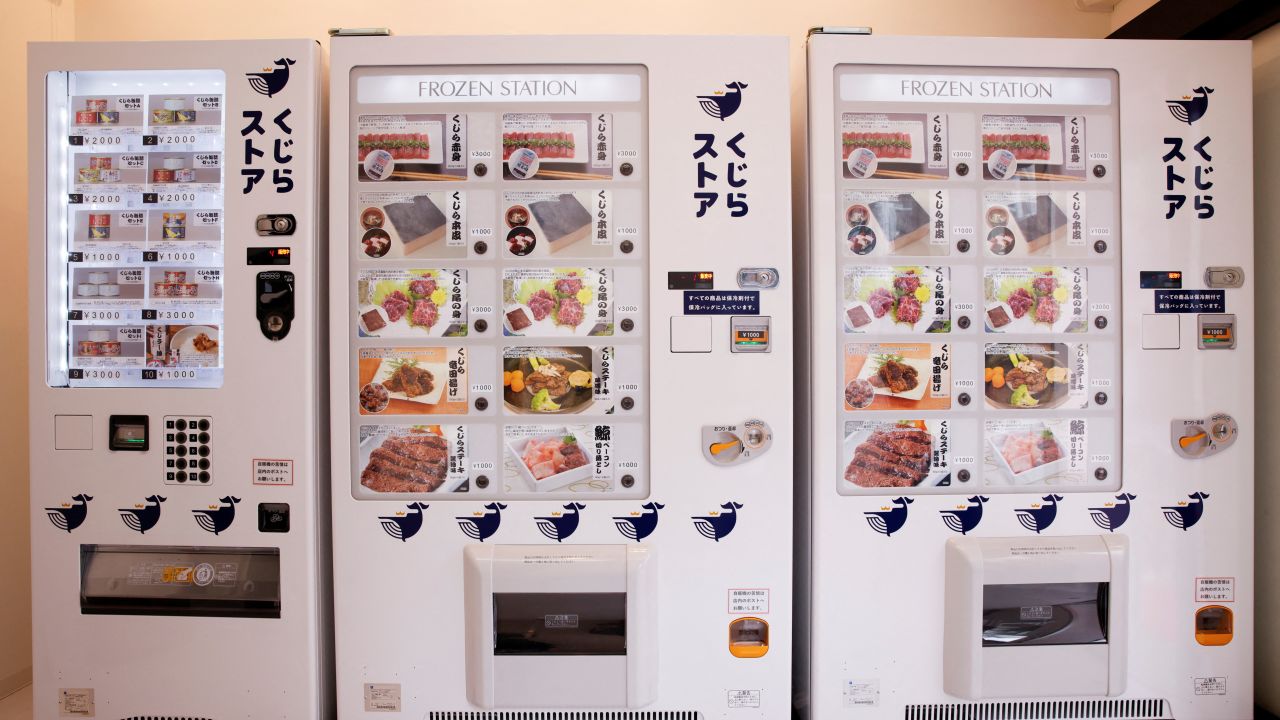What’s behind Japan’s new strategy of selling whale meat in vending machines? That is the question many are asking after the media informed that the Japanese company Kyodo Senpaku installed four vending machines offering skin, frozen meat, and canned cooked whale pieces in the Japanese capital and other locations of the Asian country.
After all, in the last sixty years the consumption of this type of food has only decreased. In 1962, whale was the second most popular meat in the Japanese market, with more than 230 thousand tons marketed annually. By 2021 its popularity had already fallen sharply to only 1,000 tons.
Yet Japan’s government continues to hand out millions of dollars in annual subsidies to keep a market that lacks consumers. Multiple strategies have included the introduction of whale meat in school snacks, culinary campaigns, and even a website to promote whale meat outlets. The sale through vending machines seems to be one more tactic to revive the consumption of these marine mammals in the country.
Kyodo Senpaku, the fishing company historically designated by the Japanese government to sell the meat of whales illegitimately killed in the Antarctic for supposed scientific purposes, plans to install 100 vending machines throughout the country.
Since similar strategies have failed in the past, many people question what motivates the Japanese government to continue investing millions of dollars in reviving a dying industry.
According to the former commissioner and current Japan government observer to the International Whaling Commission (IWC), Joji Morishita, it all boils down to sustainable use.
In a recent article explaining Japan’s departure from the IWC in 2018, Morishita states that the resumption of commercial whaling is not his country’s only political goal in this international body. Defending and promoting sustainable use is an objective of equal importance. The main reason would be the position of anti-whaling countries and civil society organizations. According to Morishita, they consider whales special or charismatic animals that should not be exploited regardless their conservation status. For the former delegate to the IWC, this view ignores the principle of sustainable use and lacks a scientific basis. But what is most worrying for Japan, the article asserts, is that the vision of these countries and civil organizations is not limited to whales, potentially impacting Japan’s right to continue exploiting other species.
Yet, the sustainable use goal promoted by the government of Japan threatens the conservation of wild species.
In general, sustainable use is understood as “the utilization of components of biological diversity in a manner and at a rate that does not cause its long-term decline, thereby maintaining its potential to meet the needs and aspirations of present and future generations.”
However, the current state of biodiversity on the planet shows that the principle of sustainable use has utterly failed. In 2019 the Intergovernmental Science-Policy Platform on Biodiversity and Ecosystem Services (IPBES) published the most comprehensive report on the state of biodiversity to date.
The Global Assessment Report affirms unequivocally that “nature is declining globally at a rate unprecedented in human history, and the rate of species extinction is accelerating.” The report concludes that nearly 1 million animal and plant species are at risk of extinction, many within a matter of decades.
According to the report, direct exploitation (which is just another term for sustainable use) is the most important driver of the decline and risk of extinction of marine species.
The findings of the Global Assessment Report not only show that “use” or “direct exploitation” is not sustainable. It also demonstrates that the promoters of the sustainable use principle seek to block any questioning of the unsustainable exploitation of wildlife so they can continue implementing a model that only benefits an exclusive minority of people associated with powerful political and economic groups. All at the expense of the destruction of marine ecosystems.
The Japanese government’s objective not only undermines the urgent need to generate measures and policies to reverse the extinction of hundreds of thousands of wild species in the coming years but consciously ignores the scientific evidence that confirms the vital role these living species play in the functioning of the ecosystem.
In the case of whales, they are fundamental to the fertilization of the ocean. The nutrients found in their feces, such as nitrogen and iron, are vital for the blooming of micro-algae known as phytoplankton, which are the staple food for tens of thousands of small animal species (zooplankton) on which all marine life depends. Whales also play a fundamental role in a topic as urgent and contingent as climate change. Their huge bodies are enormous reservoirs of carbon dioxide (CO2). Each great whale can absorb an average of 33 tons of CO2 over its lifetime. And when they die, their remains fall to the sea floor, sequestering carbon for centuries and even millennia.
The services provided by whales to the functioning of the ecosystem are so relevant that in 2014 the IWC approved a resolution led by Chile with the support of regional countries (known as the Buenos Aires Group) to stop considering these animals a simple “exploitable resource” and include the evaluation of these services in the decision-making process. Since then, several international organizations have followed this example, creating the basis for constructing a new way of relating to nature. One that is not limited to its sustainable use but that understands, based scientific research evidence, the complex relationships between species, and how their protection and conservation are necessary for the maintenance of life on earth and the well-being of humanity.
For this reasons, the objectives behind the Japanese government’s strategy of trying to boost whale consumption once again by selling them in vending machines are, at the very least, concerning. As stated by Nanami Kurasawa, director of the Japanese NGO, International Whale and Dolphin Action Network (IKAN), “the problem is not the vending machines themselves, but what they can cause.”
By Elsa Cabrera, executive director, Centro de Conservación Cetacea



